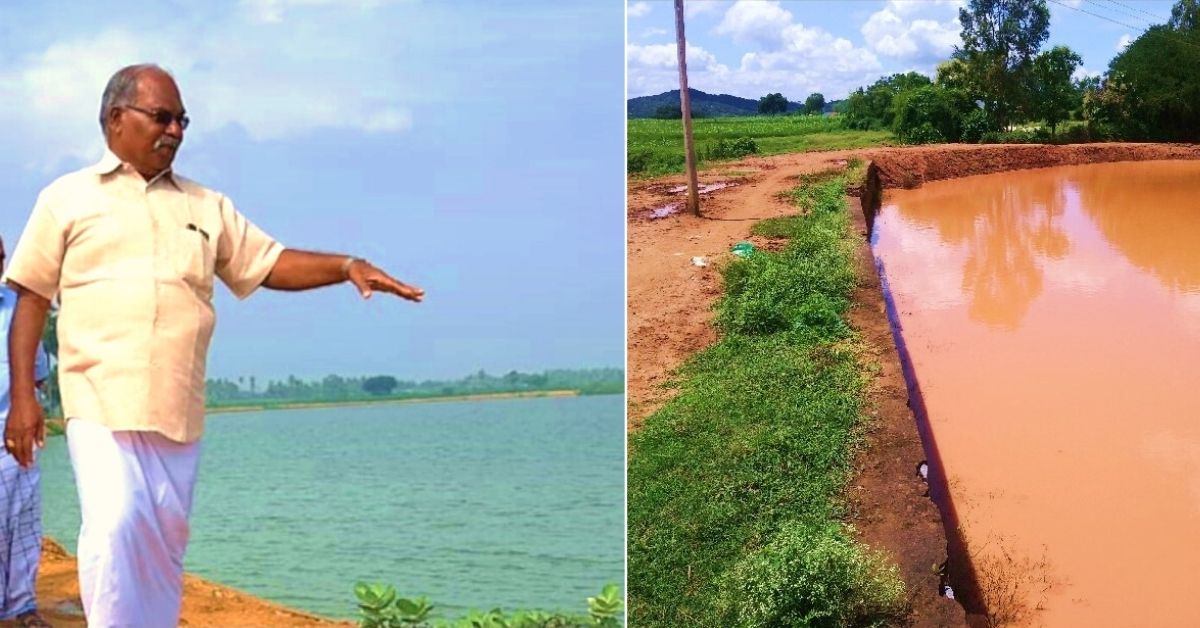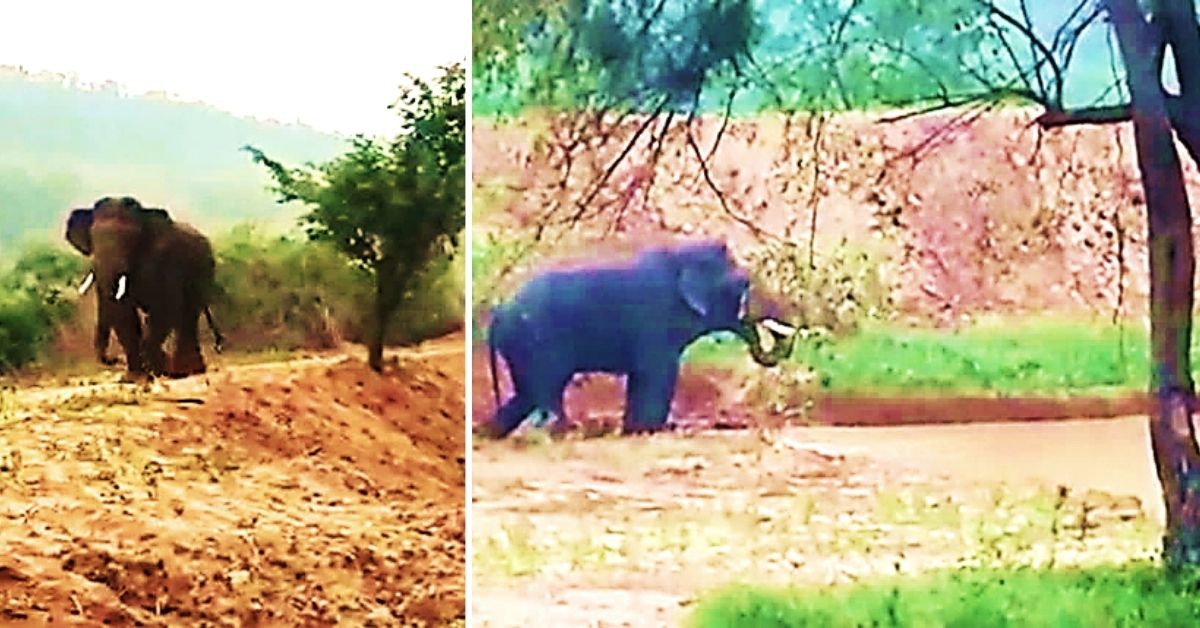This article has been sponsored by TVS Motor Company.
In a remote village called Puliyoorkurichi, in Tirunelveli district of Tamil Nadu, Andrew Thayagarajan, a small farmer, used to struggle to sustain a family of four by cultivating paddy and banana.
For the past few decades, this region has suffered due to water shortage, specifically for agricultural purposes. Largely dependent on rainfall, farmers like Andrew, failed to reap good profits out of paddy and banana crops due to inefficient irrigation techniques, pushing many to the brink of poverty.
As a last resort, the farmers dug up 2 feet deep and the total height of the water was raised to 8 feet in the minor irrigation tank due to the collection of rainwater.. But even that was not very helpful as the water only lasted for 75 days, which was utilised only during the last stage of harvest.
“I have had to incur huge losses in banana crops because of the shortage of water. We tried to store rainwater to use it for farming but most of it was consumed by the end of each crop cycle. This left us with almost nothing for the rest of the year to grow other crops or even for our daily requirements,” explains the 60-year-old farmer, who echoes the plight of 350 other farmers in his village.
But things began to change in 2018 when a non-profit organisation, Srinivasan Services Trust (SST) and Sundaram Clayton Ltd, came forward to lend a helping hand. After years of strategic planning, SST de-silted the minor irrigation tank in 2020 to a depth of 2.5 feet on average, which helped in raising the water level by up to 10.5 feet, holding water for 110 days.
“Now with an extra month with adequate water supply, I have not only been able to increase our yield of paddy and banana crops but I’m also growing many other vegetables,” adds Andrew. He harvests double the previous yield from his 40-cent land, which has increased his income by 50 per cent.
It is stories of such positive impact that SST focuses on through its multi-pronged approach towards sustainable rural development and environmental conservation.
Since its inception in 1996, SST has continuously focused on empowering communities to create positive change from within. While doing so, it has also mobilised them to become watchdogs of the environment. The Corporate Trust has successfully facilitated respite for several drought-hit villages in Tamil Nadu with the help of the project.

SST teams identified tanks and lakes meant to be used for irrigation purposes. They carried out desilting work, including de-clogging of all supply channels for the free flow of water to ensure sustainable agriculture across villages. In the last four years, 276 minor irrigation tanks have been desilted in districts including Thoothukudi, Tirunelveli, Tiruvannamalai, Krishnagiri, Tiruchirappalli, Dharmapuri, Nagapattinam of Tamil Nadu and Shirur district in Pune. The efforts taken by the trust resulted in the economic prosperity of the farmers through the effective utilisation of resources.
Mr Swaran Singh, Chairman of the Srinivasan Services Trust (SST), says “Water conservation has become the need of the hour to alleviate impending water scarcity through effective water resource management. In India, this compounded scarcity has affected the livelihoods of people and other living species in the ecosystem, such as wildlife, due to the over-exploitation of natural resources, erosion of soil and disrupted water cycle. This critical challenge can be addressed through strategic interventions by restoring local water bodies and using water efficiently while ensuring its equitable distribution.
At Srinivasan Services Trust, we collaborate with the Government and work closely with rural communities to assess the threat to the water resources and implement strategic interventions to secure the ecosystem.
These initiatives include construction of water harvesting structures, desilting of tanks, reforestation of degraded forests, tree plantation in private and public lands, and educating people through awareness programmes on water conservation. Furthermore, the desilting projects are also implemented in forest areas with the consent of the Forest Departments, to reserve water as a measure to protect the wildlife species that were often impacted by the drought.”
Marrying wildlife conservation with public welfare

SST also stepped in to desilt waterholes inside the state’s forests with the help of the Forest Department.
A part of Brahmagiri-Nilgiri-Eastern Ghats’ elephant landscape, the Hosur forest division in Tamil Nadu, is home to almost 250 elephants, both migratory and resident. Additionally, the belt is also known to be a sanctuary for an exquisite diversity of flora and fauna, which includes almost 1,000 species of rare, endemic and endangered plants, animals, birds and insects.
However, recent years recorded a sharp decline in these wildlife species due to droughts, resulting in the complete drying up of numerous waterholes around the region. The situation pushed many wild animals to migrate out of the forests searching for water, risking more cases of casualties due to human-animal conflict. One of these problems includes the destruction of agricultural lands and crops that were already in crisis due to the failure of the monsoon.
Since 2019, with their steadfast resolve, SST has desilted a total of 8 waterholes in Jawalagiri, Thally and Anchetty forest areas, thus covering almost 6 acres of land.
Thanks to this project, the water storage capacity of these waterholes have now increased from 17.61 million litres to 58.13 million litres.
Combatting forest fires
Thanks to the afforestation efforts of SST, in conjunction with the Tamil Nadu Forest Department, things have begun to change for the better.
A cluster of villages between Vellore and Thiruvannamalai, known as Padavedu, were engulfed in forest fires caused by the summer heat for years. The expanse of barren lands and hillocks lacking in green cover made the situation worse.
One of their first initiatives involved protecting the plantations from summer fires. SST laid down several fire-preventive measures, which included setting up a group of fire protection watchers. With these measures in line, SST was able to protect almost 5,050 hectares of forest plantations between the years 1997 to 2008.
However, this was not enough to restore the biodiversity in the area. So, SST decided to start plantation drives to make up for the lost flora. The first drive took place in 2003, in Holly Hills of Thiruvannamalai, where 5,000 saplings were planted on 10 hectares of forest land. Over the years, they continued to increase the green cover in the region along with other fire-preventative initiatives. So far, SST’s afforestation drive has been carried out to cover more than 600 acres of forest land in Tamil Nadu, which has helped restore the ecological balance but also considerably reduced the temperature in the area.
Through initiatives like this, fueled by its 400 field staff, SST balances public welfare with environmental conservation.
Thriving on positive transformation through systematic changes, SST links communities and several government departments and other organisations.
SST’s last-mile delivery model is not based on just grants or charitable donations, instead, it involves connecting these organisations with the community members to enable a cycle of positive change. It does so, by being the catalyst that identifies on-ground problems and allows the communities to arrive at solutions using available resources.
No comments:
Post a Comment